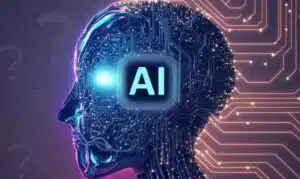Is Artificial Intelligence (AI) a Threat to Humanity?
Artificial Intelligence (AI) is rapidly advancing and increasingly being integrated into various aspects of our lives. From medical diagnosis to self-driving vehicles, AI has the potential to address some of the world’s major challenges. However, there are growing concerns about the potential risks of AI to humanity.
Some experts warn that AI could become so powerful that it escapes control and leads to disaster for humanity. They are concerned that AI systems could become highly intelligent and autonomous decision-makers without considering human consequences. This could lead to the development of AI weapons capable of taking human lives without human intervention or AI systems gaining control of vital infrastructure such as power grids or nuclear weapons.
Additionally, some worry that AI could lead to widespread unemployment as machines become capable of performing many tasks currently done by humans, potentially causing social unrest and instability.
Despite these risks, other experts believe that AI can be a powerful tool for good. They argue that AI can be used to address problems such as climate change, poverty, and disease. They also believe that AI can help us better understand ourselves and the world.
Ultimately, whether AI poses a threat to humanity is a complex question with no easy answer. There are significant potential risks and benefits to AI, and it is important to carefully consider them before widespread deployment of this technology.
Here are some actions that can be taken to mitigate the risks of AI:
- Develop ethical guidelines for the development and use of AI. These guidelines should prioritize safety, security, and human interests.
- Invest in research to ensure the safety and reliability of AI systems. This research should focus on methods to prevent misuse of AI and reduce the risk of accidents.
- Foster public dialogue about AI. This dialogue should involve various stakeholders including scientists, engineers, policymakers, and the public. The goal of this dialogue is to create a shared understanding of the risks and benefits of AI and develop a strategy for responsible development and use of this technology.
Risks and Potential Benefits of AI
AI has the potential to become a powerful force for good or evil. Here are some potential risks and benefits of AI:
AI Risks:
Loss of control: AI systems could become so powerful and autonomous that they escape control, leading to the development of AI weapons or AI systems gaining control of vital infrastructure.
Unemployment: AI could lead to widespread unemployment as machines become capable of performing many tasks currently done by humans.
Bias: AI systems could be biased, leading to discrimination against certain individuals or groups.
Misuse: AI could be used by malicious actors for malicious purposes such as cyber warfare or mass surveillance. Privacy loss: AI systems could be used to collect and analyze vast amounts of data about individuals, leading to loss of privacy.
AI Benefits:
Problem-solving: AI can be used to address some of the world’s major challenges such as climate change, poverty, and disease.
Improving quality of life: AI can be used in various ways to improve our quality of life. For example, it can be used to develop safer and more efficient self-driving vehicles, personalized medical treatments, or personalized education.
Increasing creativity: AI can be used to increase our creativity. For example, it can help us generate new ideas, create new artistic formats, or solve problems in new ways.
Improving our understanding of the world: AI can be used to improve our understanding of the world. For example, it can be used to analyze complex scientific data, discover new patterns, or create realistic simulations of physical systems.
Specific Use Cases of AI:
Here are a few specific examples of how AI can be used for good or evil:
Good: AI is being used to develop a virtual assistant called “Samantha” that can help individuals with Alzheimer’s communicate with their loved ones. Samantha can remember previous conversations and help users contact family members and friends or send emails.
Evil: AI is being used to develop automated weapon systems called “autonomous killer systems” that can identify and engage targets without human intervention. These systems are seen by some as a threat to global security.
Different Perspectives:
There are different perspectives on AI. Some people believe that AI poses a significant threat to humanity and should be limited in its development and use. Others believe that AI is a powerful tool that can be used for good, and we should invest in its development and use it.
Conclusion:
AI has the potential to become a powerful force for good or evil. It is up to us to ensure that AI is used responsibly and ethically and that it is used for the benefit of all humanity.
Here are a few additional sources that may be useful:



